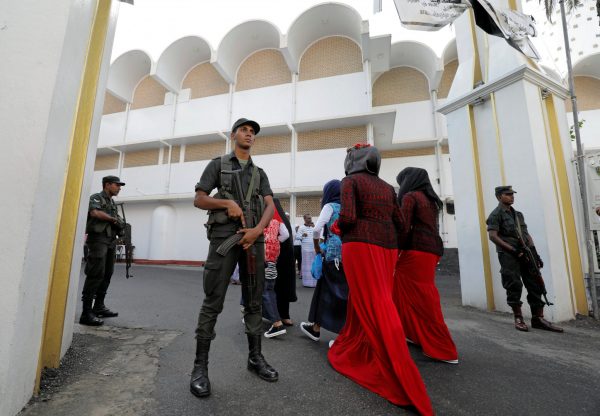In the aftermath of the tragic attacks on Easter Sunday, religion has become the concern of the day. The country faces a host of pressing issues including massive economic inequality, failing environmental management, a crushing sovereign debt and China’s looming power. It also faces a dire political situation characterised by chronic in-fighting, corruption and the occasional constitutional crisis. Even so, it is the issue of religion which generates passion and concern at levels similar to those sparked by topics of language, ethnicity and federalism during Sri Lanka’s civil war.
Also similar to the civil war days are the polarising and unproductive ways with which this dominating issue of religion is being dealt. Sri Lanka’s popular media and politicians seem to be presenting religion, especially Islam, as a source of danger, violence and radicalisation. At the same time, through dog-whistle politics, police inaction and presidential pardons, Sri Lanka’s government is giving unprecedented licence to the most aggressive and extreme forms of Sinhalese Buddhism.
This recent politicising of religion — which condemns one form of extremism while quietly sanctioning the other — is having disastrous consequences for social harmony on the island. One can see this in the blaming, in many cases en masse, of Islam and Muslims for the terrorist attacks. This storyline has fuelled numerous acts of vandalism, intimidation and violence against Muslims on the island, including some of the worst anti-Muslim attacks that the island has seen (though coming on the heels of similar violence in 2014 and 2018). The narratives have driven many Sri Lankan Muslims — especially women wearing religious attire — to live in a state of fear and insecurity.
Disaster also portends in the rapidness with which politicians and religious leaders are normalising highly chauvinistic versions of Buddhism. Even if they do not directly endorse these ideas, they often refuse to contest them publicly. Such silence gives the distorted impression that hatred and thuggery, such as that shown in Minuwangoda, are somehow acceptable among the Buddhist mainstream.
Sri Lanka needs to address instances of violence and prejudice that are taking place in the name of religion. Yet, dealing with these matters simply as religion or as instances of religious conflict — rather than as complex problems linked to politics, inequality, criminality and racism — is also misguided. Doing so not only overlooks the broader historical, institutional and sociological dimensions of the violence and conflict, it also unwittingly feeds into an us-versus-them mentality in which religious identities are assumed to be monolithic and naturally antagonistic.
A simplistic focus on religion, Islam or Buddhism in their most pathological and militaristic forms also hides from view the fact that most of the island’s Muslims and Buddhists do not hold the same belligerent views. It was Muslims who nearly three years ago first warned Sri Lankan officials about the alarming teachings of the rogue individuals who carried out the terrorist attacks on Easter Sunday. In the aftermath of the bombings, it was Muslims again who were among the most vociferous in their condemnation and repudiation of the attackers and their beliefs. In the weeks since the attacks, religious leaders from all faiths — including Buddhist monks — have taken up leading roles in condemning anti-Muslim violence and appealing to Sri Lankans to look after each other.
Beneath the political sloganeering and newspaper headlines of a ‘Buddhist–Muslim’ conflict lies also decades, even centuries, of everyday religious cooperation and coexistence that is visible in schools, holy sites, city neighbourhoods and rural villages. Sri Lanka does have chauvinists, ideologues and militant groups that do horrible things in the name of religion. But to concentrate entirely on their story, and ignore these others, is to affirm a grim and partial vision of Sri Lanka’s religious past, present and future.
Ten years after Sri Lanka’s civil war, religion and politics seem more tightly bound than ever. The question remains: which aspects of religion will the country call into view? Will it be the simplistic but politically expedient stories of them-and-us that led to the outbreak of war forty years ago? Or will it be a more complex story that focusses on the island’s longer history of resilience, its multiplicity of identities and its deep resources of compassion and creativity?
These stories are harder to sell in political campaigns and newspaper headlines. But if deployed with courage, they might help move the country into a new era, rather than returning it to an old one, yet again.
Dr Benjamin Schonthal is an Associate Professor of Religion and the Associate Dean (International) for Humanities at the University of Otago, Dunedin. ‘Avoiding Sri Lanka’s next civil war’ was accepted for EAF publication on 27 May 2019.

